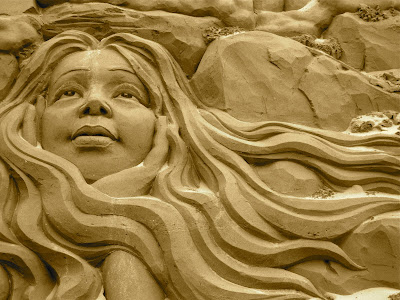
Sign at the Fulong Sand Sculpture festival
Brendan's hawk eyes noticed this sign before I did.
So.
Ummm...excuse me? Leaving aside the horrible phrasing of "After a century, Taiwan celebrates its 100th year anniversary" (as opposed to celebrating what? What else do you celebrate after 100 years?)...
...I would dearly like to know what happened in 1911 in Taiwan that would cause Taiwan to celebrate its centennial. Something happened in China 100 years ago, for sure, and not one but two governments celebrate it. Nothing, however, happened in Taiwan. On October 10th, 1911, the Taiwanese and Japanese woke up and went about their day as usual. In a country on the other side of the Taiwan Strait a lot was going on, but that has nothing to do with Taiwan. The sentence makes it sound like Taiwan didn't exist before 1911 - as though the KMT, despite the fact that they didn't arrive for several decades more, founded the country in 1911, or discovered the island, or something.
The Republic of China, sure. And yes, the Republic of China is the name of the sovereign government of Taiwan (which I do think should be called the Republic of Taiwan, but that's a whole 'nother rant) now, but it wasn't then. The sign would be correct to say "The Republic of China celebrates its 100th anniversary".
Which it did.
In China.
I'm sure this was written as it was to appease some douchebag from the Chinese government, or the Chinese artists listed as having worked on the corresponding sculpture (which is this one - the side is of Taipei 101 and Spongebob from my previous post):


...or maybe some douchebag in the KMT. The latter actually makes the most sense, considering that the phrasing as it is makes no sense at all. Or it was some sort of compromise that made everyone roll their eyes.
Not only should the government not be giving in to such demands, whether they are internal or international, but they should lay ground rules for these events along the lines of "you respect the reasonable language we use to express our sovereignty, you respect us and our dignity, or don't bother coming to, sponsoring or participating in our festival."
More happily, though, we also saw this sign:

The "正" should be read in Taiwanese (I believe it sounds like biang with a falling tone, but I don't really speak Taiwanese) and I suppose means "really" or "very".
Hooray for dai gi popping up on signage!
















